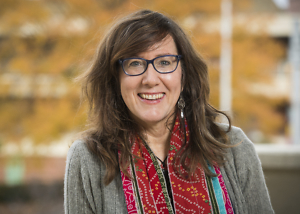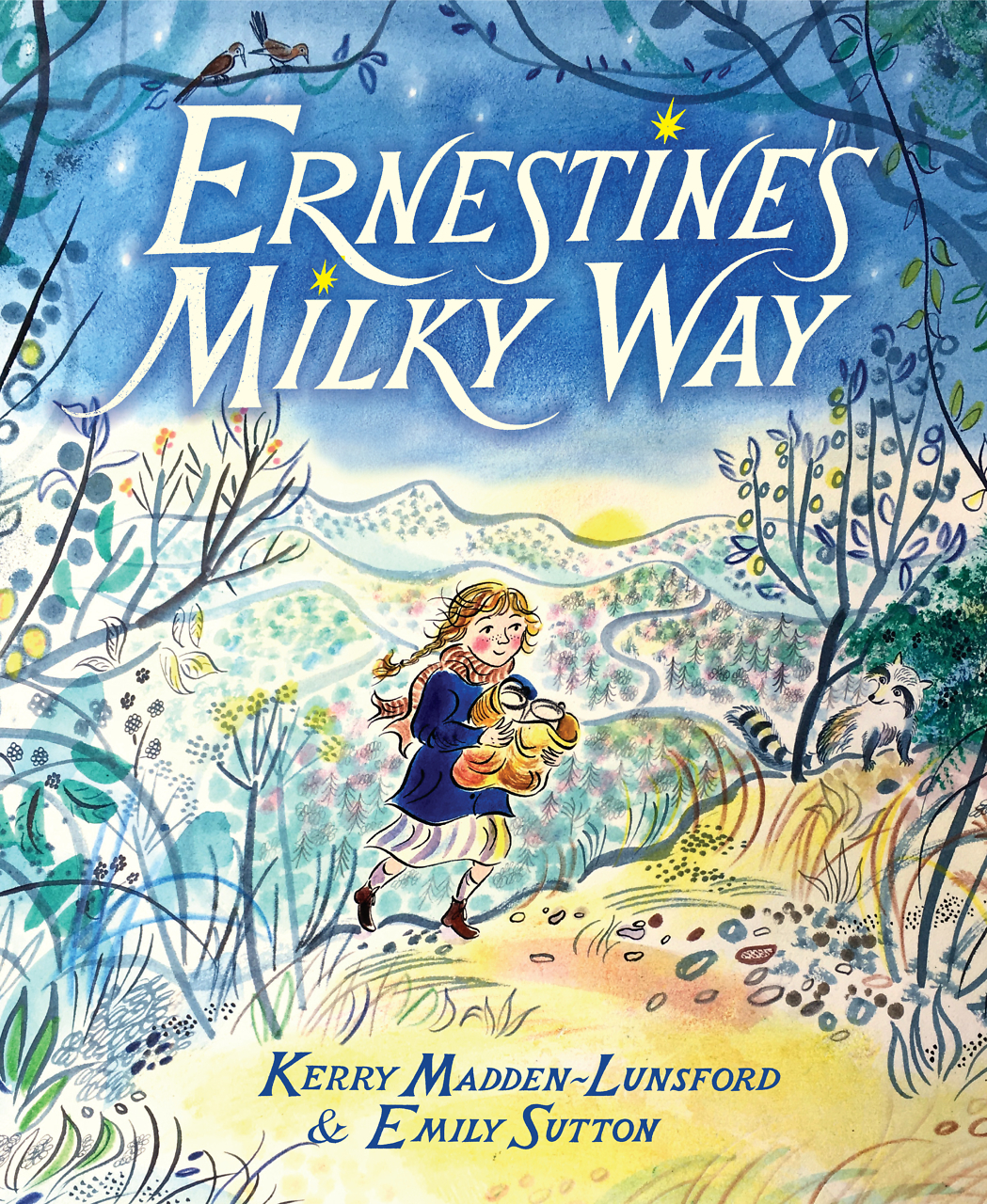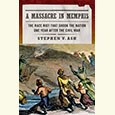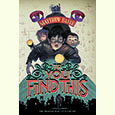Helplessly in Love
Chapter 16 talks with Anne Lamott about her faith, her new grandson, and why she believes kids are sometimes better off in single-parent homes
Novelist Anne Lamott has built a career of writing hilariously and movingly about her own shortcomings: she’s bossy, she’s anxious, she often forgets important lessons she’s already learned many times. Nevertheless, she has become a kind of patron saint to millions of readers, whole categories of readers, who welcome her advice on parenting, writing, faith, and recovery from addiction. Lamott’s book of writing advice, Bird by Bird, is a bestseller. Her books on faith—Traveling Mercies, Plan B, and Grace (Eventually)—are bestsellers. Her first parenting memoir, Operating Instructions: A Journal of My Son’s First Year is, yes, a megabestseller.
Now Lamott is back, this time with her first grandparenting memoir, Some Assembly Required: A Diary of My Son’s First Son. Written with her son, Sam Lamott, who was nineteen when his first child was born, Some Assembly Required is an account of the year Sam learned to be a father and Lamott learned the difficult role of a grandmother: to love recklessly and keep her mouth shut as tightly as possible.
Lamott will appear at the Nashville Public Library on April 3 as part of the as part of the Salon@615 series. She answered questions from Chapter 16 via email about her new memoir—and about her new book on faith, Help, Thanks, Wow: The Three Essential Prayers.
Chapter 16: Over the years, many, many people must have asked you how Sam felt, as he grew up, about being the subject of Operating Instructions, and now Some Assembly Required conveys, in his own words, his unequivocally enthusiastic response. Still, the privacy of children seems to be a subject of perpetual debate among memoirists and mommy bloggers alike. Are there any guidelines you follow that might explain why Sam didn’t grow up resentful of Operating Instructions and in fact loved the idea of working with you on a similar book about his own son, Jax?
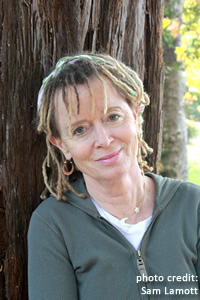 Anne Lamott: I always ask Sam if I can use something, and have done so since he was ten or so—I think it’s very easy to know when something is private or embarrassing. I have always asked myself sternly if this or that was something Sam could feel good about, if it was public.
Anne Lamott: I always ask Sam if I can use something, and have done so since he was ten or so—I think it’s very easy to know when something is private or embarrassing. I have always asked myself sternly if this or that was something Sam could feel good about, if it was public.
Chapter 16: As you’re walking with a fussy Jax in the back of church one Sunday, a fellow congregant remarks, “You look beautiful in that grandson,” and in the book you write movingly about the advantages of grandparenthood: it offers a big-picture view of childhood and life, while being a parent is too often mired in the slog of just getting through the day. But there’s also, for you, a constant, wrenching realization that you’re on the periphery of this family, that Jax is Amy and Sam’s baby, not yours. Are grandparents even more vulnerable in loving their grandchildren than they were in loving their children?
Lamott: Oh, no, much less. But all grandparents that I know are just pathetic, including me. You just fall so helplessly in love, and yet you really have no rights, and no one is interested in your opinion on how best to raise this precious child.
Chapter 16: For you, part of the wonder of grandparenthood has been watching the transformation in Sam. Trying to balance school and fatherhood and an unhappy partner in a troubled relationship is far more than many nineteen-year-olds can manage, but Sam does. Surely he learned much of that resilience from growing up with you, a single, self-employed mother. What about you—did you learn anything from Sam in watching him wrestle with the sudden shift in his own life once Jax was born?
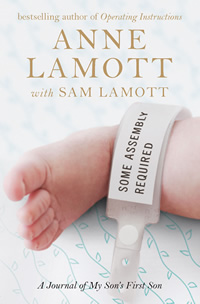 Lamott: Well, I sure remembered how incredibly hard it is to parent; and how exhausted you are all the time. I learned once again that most difficulties pass (as do most beautiful patches of time.) I think the faith he was raised in gave him a deep sense that we are not alone, and no matter how scared and overwhelmed you are, God will provide people and resources to help you through. Also, I got to see how a strong sense of humor is about fifty percent of the battle.
Lamott: Well, I sure remembered how incredibly hard it is to parent; and how exhausted you are all the time. I learned once again that most difficulties pass (as do most beautiful patches of time.) I think the faith he was raised in gave him a deep sense that we are not alone, and no matter how scared and overwhelmed you are, God will provide people and resources to help you through. Also, I got to see how a strong sense of humor is about fifty percent of the battle.
Chapter 16: In Some Assembly Required, you refer many times to the emotional burden you carried for years because your parents’ marriage was so unhappy. Though you never make a direct analogy to Sam’s often-fraught relationship with Amy, I wonder if you’re relieved, now that Sam and Amy have split up, that Jax won’t have to contend with the toxic fallout that so scarred you.
Lamott: Very relieved. Nothing is worse than being a child caught in a bad marriage.
Chapter 16: You are a proud liberal and also the author of four books on faith. Do you have any theories about why the national media don’t seem to realize that liberal Christians exist?
Lamott: Well, the media is aware of a liberal wing of Christianity, but there are a lot of us. I just don’t think we are nearly as interesting as the most bizarre fundamentalists, who handle snakes or burn Korans. A bunch of people mentoring people or working in soup kitchens does not make very interesting copy or footage.
Chapter 16: “I try not to finagle God,” you write in Help, Thanks, Wow. “Some days go better than others, especially during election years.” How’s it going this election year?
Lamott: Pretty well, mostly, because I feel sort of confident of the positive outcome. I’m really trying to practice trust and surrender when it comes to this election—but the stakes are so high, when it comes to Medicare, women’s reproductive rights, the environment, so some days I get sort of bent out of shape. At times like that, I try to figure out how to raise more money for Obama; and to keep myself calm and distracted.
[This article originally appeared on September 13, 2012, in connection with an earlier event.]
On April 3 at 6:15 p.m., Anne Lamott will discuss Help, Thanks, Wow and Some Assembly Required at the Nashville Public Library as part of the Salon@615 series. The event is free and open to the public.
